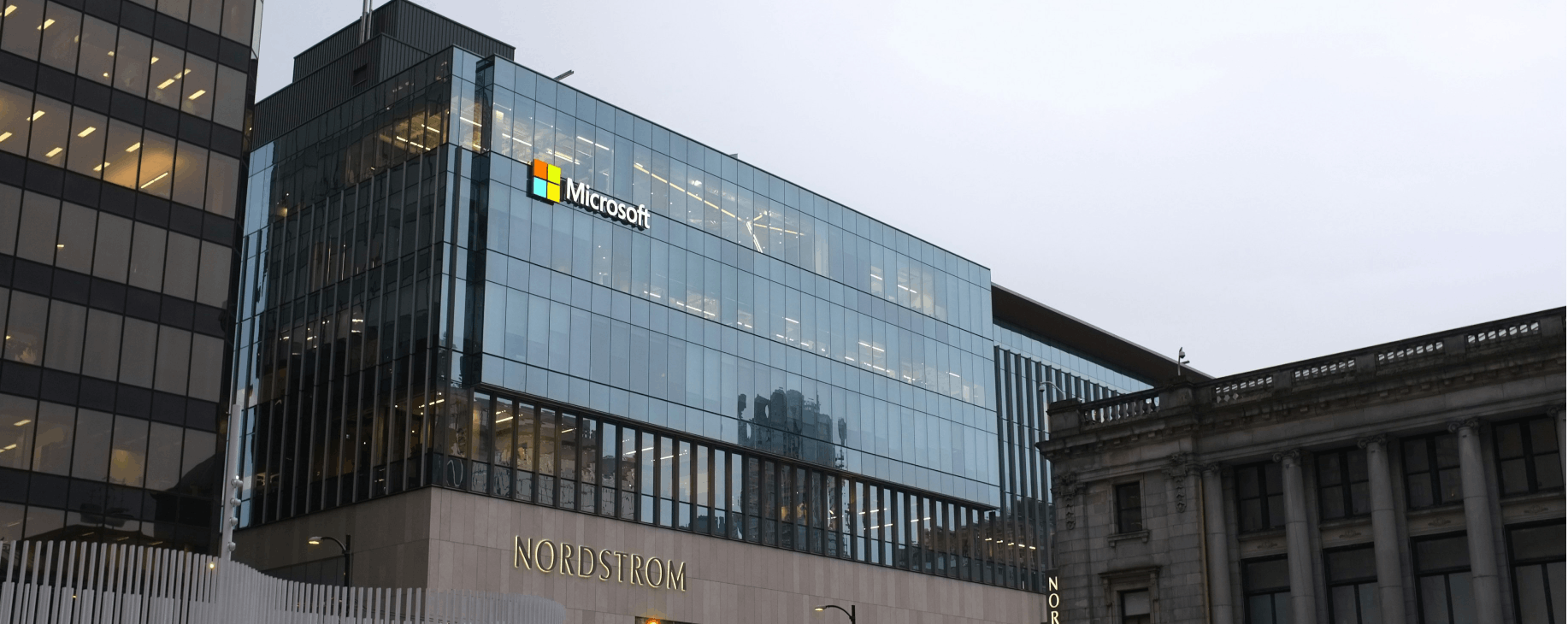
What Is Microsoft 365 GCC High? A Complete Guide for Defense Contractors
Emily Bonnie
Senior Content Marketing Manager
Rob Gutierrez
Senior Cybersecurity and Compliance Manager, CISA, CCSK, CMMC RP
If you work with the Department of Defense (or are planning to) and handle sensitive data, you've likely encountered the term "GCC High" and you probably have questions. What exactly is GCC High? Is it different from regular Microsoft 365? And do you actually need it for CMMC compliance?
Keep reading for answers. We'll cover what GCC High actually is, who needs it, what it costs, and how it relates to CMMC compliance.
What is GCC High?
GCC High is short for Microsoft 365 Government Community Cloud High. It is a specialized version of Microsoft 365 that’s designed to meet the strict compliance requirements of the US Department of Defense and their contractors, including FedRAMP High, DFARS 7012, CMMC, ITAR, and EAR.
First launched in 2016, GCC High was meant to deploy to the DoD and the Defense Industrial Base (DIB) specifically. As a result, GCC High was built differently from both Microsoft 365 Commercial Cloud and Microsoft 365 Government Community Cloud (GCC), an enclave of Commercial designed for US government customers not in the defense sector. Both these cloud environments run on Microsoft Azure Commercial, which was not intended for government requirements.
GCC High however runs on Microsoft Azure Government, a physically separated cloud infrastructure hosted in data centers located exclusively in the Continental United States. All data is stored on US soil, and there are preconfigured controls to restrict access to screened US citizens who have passed rigorous background checks.
This makes it suitable for storing Controlled Unclassified Information (CUI), Security Protection Data (SPD), International Traffic in Arms Regulations (ITAR) data, Export Administration Regulations (EAR), Covered Defense Information (CDI), and other sensitive government data.
As a result, GCC High is used by federal agencies, the DIB, and other government contractors to support compliance with the widest range of US government requirements, including:
- DFARS 252.204-7012/NIST 800-171
- CMMC (all levels)
- ITAR
- EAR
- CJIS (for federal agencies only)
- North American Electric Reliability Corporation (NERC)
- Federal Energy Regulatory Commission (FERC)

Recommended reading

What You Need to Know About Controlled Unclassified Information (CUI): Categories, Controls, and Compliance
Microsoft 365 Commercial vs. GCC vs. GCC High
This is the most common source of confusion. Microsoft offers three distinct cloud environments, each designed for different data sensitivity levels:
Commercial
Microsoft 365 Commercial is Microsoft’s standard cloud offering for businesses. While it can be used to demonstrate CMMC Level 2 compliance, it was not purpose-built to support US government regulations so it’s not suitable for DFARS 7012 compliance or CMMC Level 2 or Level 3 certification. Commercial tenants are hosted in global Azure data centers and supported by personnel who may be located outside the United States.
GCC
Microsoft 365 GCC is built for US government agencies and regulated entities. It offers improved data residency controls by keeping data within the US, but it still runs on Azure Commercial infrastructure. While GCC can support DFARS 7012 and CMMC Level 1, some services may not meet the strict access controls required for export-controlled data. Support staff may include non-US persons.
GCC High
Microsoft 365 GCC High is designed specifically for DIB organizations and cabinet-level agencies like the FBI. It provides a higher level of assurance by running on Azure Government infrastructure, storing data exclusively in US data centers, and limiting access to screened US citizens only. It is the only Microsoft 365 environment available to contractors that meets all of DFARS 7012 C-G, ITAR, EAR, and CMMC Level 2 and 3 requirements.
In simple terms: GCC High is the version of Microsoft 365 with the underlying infrastructure, security, data residency, and personnel controls required by the DoD.
Note that there is also Microsoft 365 DoD, a restricted environment for use by the Department of Defense and authorized entities only that meets DoD SRG Level 5. Microsoft says if you are not in the DoD, don't worry about this cloud tenant so we’ll limit our focus to the three below.
| Microsoft 365 Environment | Best for | Hosted On | FedRAMP Authorization | Compliance Support for Government Regulations | Access Controls |
| Commercial | General businesses | Azure Commercial | No | CMMC Level 1 possible but not intended | Global support team |
|---|---|---|---|---|---|
| GCC | Federal, state, and local governments and contractors | Azure Commercial (US only) | Moderate (& High Equivalency) | DFARS 7012, CMMC Level 1, CMMC Level 2 possible (for CUI Basic) but not recommended | US data centers, but support may include non-US persons |
| GCC High | DIB organizations and cabinet-level agencies | Azure Government | Moderate and High | DFARS 7012, ITAR, EAR, FedRAMP Moderate and High, CMMC Levels 1-3 recommended | Data and support restricted to US persons in US locations |
Recommended reading

CMMC Level 2 Compliance: How to Meet Requirements + Checklist
Who needs GCC High?
GCC High is designed for organizations that fall into one or more of these categories:
- Defense contractors handling CUI: If you process, store, or transmit CUI, you likely need GCC High since it is permissible for all categories of CUI (GCC only supports some types). GCC High is a common choice for many in the DIB, especially the larger tier 1 prime contractors.
- ITAR/EAR-regulated organizations. If you handle export-controlled technical data, the data must be stored in environments accessible only by US persons in continental US locations to meet ITAR and EAR requirements. Since GCC High was built to support this type of data and meet these requirements natively, it is the only environment which Microsoft will commit to export controls.
- Organizations pursuing CMMC Level 2 or 3: While GCC High is not explicitly mandated by CMMC, the practical reality is that most contractors need it, especially if subject to Level 2 requirements or higher. Microsoft explicitly recommends it for CMMC Levels 2 and 3 since it holistically safeguards all categories of CUI and offers built-in support for NIST 800-171 requirements through underlying Cloud-Native controls provided by Microsoft, reducing the number that must be implemented through your own configuration, policies, and processes.
- Federal agencies requiring FedRAMP High: Agencies with high-impact data systems that need to demonstrate compliance with FedRAMP High (or Moderate) use GCC High. This includes the US Department of Homeland Security, the Department of Justice, Department of the Treasury, and FBI.
- Subcontractors in the defense supply chain: For aerospace and defense manufacturers and other subcontractors in the DIB, DFARS 252.204-7012 and CMMC requirements flow down from primes to your tier. Since Microsoft supports a flow-down for DFARs 7012 in GCC High and in Azure Government, GCC High automatically meets some NIST 800-171 requirements, reducing the number of requirements the customer has to meet through their own configuration, policies, and processes when pursuing DFARs or CMMC Level 2 compliance.

Who does NOT need GCC High:
- Contractors that handle only Federal Contract Information (FCI) — CMMC Level 1 does not require GCC High (but is recommended)
- Commercial Off-The-Shelf (COTS) suppliers — exempt from CMMC entirely
- Organizations using alternative FedRAMP-authorized platforms (e.g., Google Workspace with Assured Controls, AWS GovCloud with supplemental tools)
Recommended reading

Export Controlled Information: What It Is, How It’s Regulated & How It Relates to CMMC
Do you need GCC High for CMMC?
Technically, no. GCC High is not the only Microsoft cloud offering you could use to meet CMMC requirements.
Microsoft 365 Commercial could be used to demonstrate compliance with CMMC Level 1 for FCI, but this cloud offering is not intended for US government requirements and therefore it is a risk since changes in regulations may lead to non-compliance in the future.
For CMMC Level 2 or higher, this is where it gets nuanced.
DFARS 252.204-7012 is the clause that requires contractors to protect Covered Defense Information and was amended and strengthened by the final CMMC 48 CFR rule. This clause states that cloud services must meet "security requirements equivalent to those established by the Government for the Federal Risk and Authorization Management Program (FedRAMP) Moderate baseline."
A December 2023 DoD memo further clarified that "FedRAMP equivalent" means the cloud service must either:
- Hold a FedRAMP Moderate or High authorization, or
- Be assessed by a FedRAMP-recognized third-party assessment organization confirming all FedRAMP Moderate baseline controls
Since Microsoft 365 Commercial could not sufficiently meet these requirements to demonstrate FedRAMP Moderate equivalency, this memo effectively eliminated it as a compliant option for storing, processing, or transmitting CUI under DFARS 7012 or CMMC.
Microsoft 365 GCC, however, is FedRAMP Moderate authorized with demonstrated High equivalency through FedRAMP High Impact Level audits, and can technically support DFARS 7012 and CMMC Level 2 under some configurations. But it comes with more limitations and a greater burden of proving compliance.
That’s because it does not offer built-in support for certain categories of CUI, including export controlled data, like GCC High does. That means you’ll
- have to isolate and implement the necessary data residency and sovereignty controls for certain types of CUI that are protected under ITAR, EAR, and other US defense regulations.
- be responsible for ensuring you restrict certain services and properly configure your Microsoft GCC environment to limit the access, processing, and transmission of this data to US persons in the continental US only
This introduces the risk of non-compliance due to foreign access or misconfigured commercial features.
GCC High supports export controlled data natively, with controls in place for restricting sensitive data access, processing, transmission, and storage to only screened US persons and within the continental US. As a result, GCC High is the safest and most straightforward path for organizations that need to comply with CMMC Levels 2 or 3 requirements and is explicitly recommended by Microsoft.
Bottom line: You need a cloud environment that’s at least FedRAMP Moderate or equivalent with data residency and sovereignty controls for CUI to comply with CMMC Level 2 or higher. GCC High is the most common choice, but alternatives exist.
Recommended reading

Google Workspace vs Microsoft 365 Commercial vs GCC High: Which Can You Use for CMMC, DFARS, and ITAR Compliance?
Is GCC High ITAR compliant?
Yes. GCC High was built with ITAR compliance in mind.
It meets all security requirements for protecting export-controlled data under ITAR and EAR, including exclusive US data residency, restricted US personnel access, and physical and logical separation from commercial Microsoft tenants.
If your business involves technical data or defense articles regulated under ITAR, GCC High is likely your only viable Microsoft 365 environment.
Note that ITAR compliance remains a shared responsibility. While GCC High covers Microsoft's infrastructure obligations, your organization must still manage access controls, data classification, and any third-party integrations.
Recommended reading

How ITAR Cybersecurity Requirements Apply to Contractors in the Federal Supply Chain
What services are included in GCC High?
GCC High supports many of the compliance-enabling tools that DoD contractors need, such as:
- Microsoft Entra ID: Formerly Azure Active Directory, Entra ID provides identity and access management for users, devices, and applications in GCC High. It supports features like Conditional Access, multifactor authentication (MFA), and role-based access control (RBAC), all critical for enforcing zero trust principles and meeting CMMC and NIST identity management requirements.
- Microsoft Intune: Intune enables mobile device management (MDM) and mobile application management (MAM) for government cloud environments. It allows you to securely manage endpoints, enforce configuration baselines, and apply security policies across all devices accessing sensitive data, supporting controls in NIST 800-171 and CMMC related to system configuration and media protection.
- Microsoft Sentinel: Sentinel is a cloud-native security information and event management (SIEM) platform that collects, analyzes, and correlates logs from across your environment—including GCC High workloads. It enables advanced threat detection, incident response, and security analytics aligned with continuous monitoring and audit logging requirements in frameworks like CMMC, DFARS, and FedRAMP.
- Microsoft Purview Information Protection: Allows you to discover, classify, and protect CUI through sensitivity labels and data loss prevention policies. It helps ensure that sensitive data stays within your controlled environment.
- Microsoft Defender for US Government: Provides endpoint and email protection, with features like threat analytics, attack surface reduction, and real-time reporting to support NIST 800-171’s system integrity requirements.
- SharePoint and OneDrive for US Government: Provide secure content management, storage, and collaboration tools, configured to meet FedRAMP High and CMMC data handling standards.
- Microsoft Teams: Enables secure communication and file sharing, though some features available in Commercial tenants like PSTN calling require workarounds in GCC High.

The feature set of Microsoft 365 GCC High is substantial but not identical to Microsoft 365 Commercial. For example, Microsoft Teams PSTN calling plans are not natively supported in GCC High, requiring third-party telephony integrations instead.
This is for two primary reasons: either the features are not currently available or they may never be. New features typically arrive in the commercial cloud first and roll out to GCC High months later due to the required security reviews. That’s why features like Microsoft Secure Score are noted as not yet available in GCC High, but coming soon in this documentation. However, some features like Shifts for Teams cannot be made available given the increased certification and accreditation of the infrastructure of GCC High.
Certain third-party app integrations may be restricted as well. File sharing in SharePoint and OneDrive is also limited to other GCC High environments and DoD tenants only.
These limitations are intentional, designed to reduce data security risks and preserve compliance with strict government regulations. Still, they can affect your team’s productivity, especially if you collaborate often with organizations outside the defense sector or rely on MS365 plugins that aren’t GCC High-compatible.
Check Microsoft documentation for the most comprehensive breakdown of feature availability for GCC High compared to GCC and Commercial.
How much does GCC High cost?
GCC High ricing varies by license type (G3, G5, etc.) and isn’t publicly published by Microsoft, since it’s sold through Enterprise Agreements and authorized partners. But you can expect to pay 50–70% more for Microsoft 365 GCC High compared to equivalent Commercial or GCC licenses.
This premium covers the cost of hosting data in dedicated US government data centers, employing screened US support personnel, and maintaining the additional security controls required to meet ITAR, DFARS, and CMMC compliance.
GCC High tenants often also license other cybersecurity and compliance tools like Microsoft Defender, Purview, and Enterprise Mobility + Security (EMS), which adds to the overall cost.
New option for small businesses: Microsoft launched GCC High Business Premium in November 2025, offering significant cost savings compared to enterprise licensing. This is a significant development for smaller defense contractors, such as component manufacturers and service providers, that need less than 500 seats and to comply with CMMC requirements.
How to get started with GCC High
Getting into GCC High isn't as simple as upgrading your existing Microsoft 365 subscription. The process involves the following steps:
- Verify eligibility: You need to submit an eligibility validation request to Microsoft with a CAGE code or documentation proving you handle government-controlled data
- Engage a licensing partner: You can work with a Microsoft-authorized government partner (AOS-G) for under 500 seats or a Licensing Solution Providers (LSP) for larger volumes to complete your purchase
- Procure licenses: Complete purchase to procure new GCC High licenses (your existing commercial licenses don't transfer)
- Provision a new tenant: GCC High requires a completely separate tenant from your Microsoft 365 Commercial or GCC tenant if you have one
- Migrate data: Email, files, SharePoint sites, and Teams content move to the new environment
- Configure security: Set up identity management, conditional access, MFA, DLP policies
- Train users: The interface differs from commercial M365 in some areas
- Renew license annually: GCC High licenses must be purchased on an annual basis (Microsoft does not offer monthly billing or allow mid-term license reductions)
Timeline: Expect 1-6 months from start to full migration, depending on organization size and complexity.
Building a strong infrastructure to protect CUI and other government data
Microsoft 365 GCC High is one of the most secure and compliant environments available to defense contractors and organizations in the DIB, but managing compliance across a federal tech stack still requires significant effort. From DFARS to CMMC, the path to certification involves continuous monitoring, rigorous documentation, and a strong internal security posture.
Secureframe’s compliance automation platform integrates directly with Microsoft GCC High, Azure Government, Entra ID, and AWS GovCloud to simplify compliance with frameworks like CMMC, DFARS 7012, NIST 800-171, FedRAMP, and more. We automate evidence collection, continuously monitor control performance, and give you full visibility into your compliance posture.
With Secureframe, you get more than just software. You get a partner that helps you operationalize cybersecurity, reduce assessment preparation time by up to 70%, and stay aligned with evolving federal requirements.
Ready to see how Secureframe and GCC High work better together? Schedule a demo to learn how we can help you move faster and stay secure.
This post was originally published in July 2025 and has been updated for accuracy and comprehensiveness
Use trust to accelerate growth
FAQs
What does GCC stand for in Microsoft?
GCC stands for Government Community Cloud. It refers to Microsoft’s secure cloud offerings for US public sector customers, including GCC, GCC High, and DoD environments.
What is Microsoft GCC High?
Microsoft 365 GCC High is a secure cloud environment designed for US federal agencies and defense contractors. It provides advanced compliance and data protection capabilities for handling Controlled Unclassified Information (CUI), ITAR data, and other sensitive government information, and is hosted in US-based Azure Government data centers.
Who uses GCC High?
Typical GCC High users include:
- prime contractors and subcontractors working with the Department of Defense and subject to any CMMC level
- DIB companies that handle CUI and must meet CMMC Level 2 or 3 requirements specifically
- aerospace and defense manufacturers
- organizations that handle export-controlled data under ITAR or EAR
- federal systems integrators and managed service providers that support government clients
Who uses Microsoft GCC?
Microsoft GCC is typically used by US state, local, and federal government agencies, as well as contractors that handle government data but don’t require the stricter access and residency controls of GCC High. It supports compliance with standards like FedRAMP Moderate and CMMC Level 1.
Is Microsoft GCC High FedRAMP Authorized?
Yes. Microsoft 365 GCC High is FedRAMP High authorized. It meets the stringent security requirements for protecting the government’s most sensitive unclassified data and is hosted within Azure Government infrastructure.
Is GCC High required for CMMC?
No, GCC High is not a formal requirement for CMMC certification. However, it is often the most practical choice for organizations pursuing CMMC Level 2 or 3, especially if they handle export-controlled data or are subject to DFARS 7012 C-G.
Do I need GCC High for CUI?
It depends on the type of CUI you handle. If your CUI is subject to ITAR, EAR, or DFARS 7012 C-G requirements, GCC High is the only Microsoft environment that fully meets those standards. For less sensitive CUI, GCC or Commercial may suffice if properly configured.
Is GCC High the same as Azure Government?
GCC High runs on Azure Government infrastructure, but they're not the same product. Azure Government is the underlying cloud platform. GCC High is the Microsoft 365 productivity suite deployed on that platform.
Can I use both GCC High and commercial M365?
Yes. Many organizations maintain a commercial tenant for non-CUI work and a GCC High tenant for defense work. This is the basis of the "enclave" approach. However, the two tenants cannot directly communicate (i.e., no Teams calls or file sharing between tenants).
Do all my employees need GCC High licenses?
No. Only employees who process, store, or access CUI need GCC High licenses. This is why the enclave approach can significantly reduce licensing costs.
What happens to my data if I leave GCC High?
Your data can be exported and migrated to another environment. Standard Microsoft data retention and deletion policies apply.

Emily Bonnie
Senior Content Marketing Manager
Emily Bonnie is a seasoned digital marketing strategist with over ten years of experience creating content that attracts, engages, and converts for leading SaaS companies. At Secureframe, she helps demystify complex governance, risk, and compliance (GRC) topics, turning technical frameworks and regulations into accessible, actionable guidance. Her work aims to empower organizations of all sizes to strengthen their security posture, streamline compliance, and build lasting trust with customers.

Rob Gutierrez
Senior Cybersecurity and Compliance Manager, CISA, CCSK, CMMC RP
Rob Gutierrez is an information security leader with nearly a decade of experience in GRC, IT audit, cybersecurity, FedRAMP, cloud, and supply chain assessments. As a former auditor and security consultant, Rob performed and managed CMMC, FedRAMP, FISMA, and other security and regulatory audits. At Secureframe, he’s helped hundreds of customers achieve compliance with federal and commercial frameworks, including NIST 800-171, NIST 800-53, FedRAMP, CMMC, SOC 2, and ISO 27001.